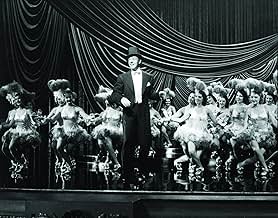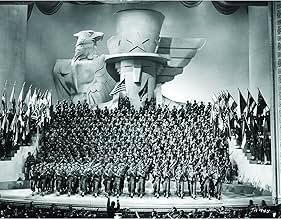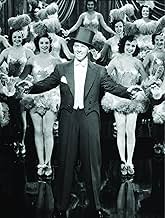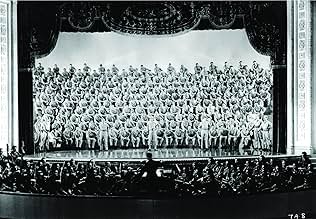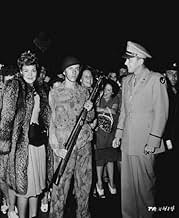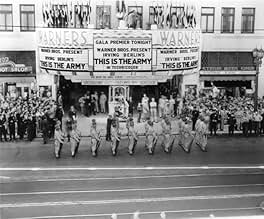CALIFICACIÓN DE IMDb
5.8/10
1.4 k
TU CALIFICACIÓN
Un soldado herido en la Primera Guerra Mundial se convierte en productor y monta un espectáculo para las tropas.Un soldado herido en la Primera Guerra Mundial se convierte en productor y monta un espectáculo para las tropas.Un soldado herido en la Primera Guerra Mundial se convierte en productor y monta un espectáculo para las tropas.
- Dirección
- Guionistas
- Elenco
- Ganó 1 premio Óscar
- 3 premios ganados y 2 nominaciones en total
Ronald Reagan
- Johnny Jones
- (as Lt. Ronald Reagan)
Alan Anderson
- Assistant Stage Manager Anderson
- (as 1st Sgt Alan Anderson)
Ezra Stone
- M
- (as M/Sgt. Ezra Stone)
- …
Opiniones destacadas
This is The Army is patriotic. It is non-stop music from end to end. Ray Heindorf did an excellent job with the montages of music that are constantly heard throughout the picture. It's a treat to hear Irving Berlin sing his own song "O How I Hate To Get Up In The Morning" with its original verse and chorus.
The print I saw was duplicated from a 35mm print. One can only hope that Warners will restore this film to its original glory. It is a piece of history and its loss would be terrible.
If you plan to rent it, dont get a copy in black and white. The costumes are beautiful in color. The color prints currently available have marginal problems due to the condition of the original master print. Dont let this put you off seeing this. It's well worth the flaws.
Oh yes, there are only a handful of women in the entire production. I warned you.
The print I saw was duplicated from a 35mm print. One can only hope that Warners will restore this film to its original glory. It is a piece of history and its loss would be terrible.
If you plan to rent it, dont get a copy in black and white. The costumes are beautiful in color. The color prints currently available have marginal problems due to the condition of the original master print. Dont let this put you off seeing this. It's well worth the flaws.
Oh yes, there are only a handful of women in the entire production. I warned you.
This movie was produced as a fund-raiser and as a morale booster. At the time it was filmed we were on the verge of losing the war and the public needed a patriotic lift. The songs are not, perhaps, the best Irving Berlin ever wrote, but they speak of the era in which they were written. For those who are politically-correct, I agree that African-Americans are not shown in the best light, but, right or wrong, that was the attitude then. The minstrel show was still a popular entertainment and the idea of white actors in black-face was considered simply show business. This show was actually staffed by real, honest-to-goodness soldiers with a few actors tossed in for the starring roles. Even if you dislike the movie, appreciate it for the look it gives into American life during the 40s. I, for one, enjoy it a lot and have watched it a half-dozen times. By the way, the sound on the VHS tape is better than on several of the DVD versions that are available.
I watch this movie often. I love the music. I wish I knew more about the man who sang the song ''Mandy''. I enjoy this movie every time like its the first time. I'm proud to own a video tape copy. I would like to see it available on DVD someday
First of all, had you done your research, you would've known that all three branches of the military had (and still have) entertainment divisions whose sole job is to produce shows for the troops. If you looked at the "Crazy Credits" section you would've learned that famed composer Irving Berlin staged the two soldier shows as depicted in the movie.
Yes, many of the skits and songs are terribly dated and yes "This is the Army" is largely a propaganda film, but Berlin singing his "Oh How I Hate to Get Up in the Morning" was the lament of every draftee.
Virtually *every* film made during WWII was done either as propaganda or to bolster the spirits on the homefront.
I respectfully suggest watching it again, but instead of looking at it with 2004 cynicism, look at it in the context of the times.
Yes, many of the skits and songs are terribly dated and yes "This is the Army" is largely a propaganda film, but Berlin singing his "Oh How I Hate to Get Up in the Morning" was the lament of every draftee.
Virtually *every* film made during WWII was done either as propaganda or to bolster the spirits on the homefront.
I respectfully suggest watching it again, but instead of looking at it with 2004 cynicism, look at it in the context of the times.
This is the type of musical that Hollywood did best and it sure was popular with the public. However, 65 years later, the film has lost much of its appeal due to changes in movie styles as well as the fact that the film's value as a propaganda tool is now lost--after all, the war has been over since 1945. So what was rousing and exciting then to the folks at home now just seems rather dated and slow--though the film still does have very good production values.
The film is basically a bazillion patriotic songs rolled up into the thinnest of plots. Frankly, I think the film could have been a lot better had the story received greater emphasis and they'd dropped a few musical numbers. This would have given the film a much needed infusion of energy--though again, back during the war years, this wasn't as big a concern.
The story, such as it is, begins during WWI. A group of soldiers (George Murphy, Alan Hale, George Tobias and Charles Butterworth and others) are interested in performing a musical to raise morale and the when they are given permission, the show is a huge hit. Many years later, when WWII arrives, the children of these same men and others put on their new and timely stage show. It's a major success and the soldiers are sent on a tour of the USA to increase the public's patriotism and backing of the war. There's a little more to the plot than this--but not much.
As I said, it's really just an excuse to string together tons of musical and dance numbers--so many that you feel a bit overwhelmed. Some of the numbers are very good, the one with Irving Berlin was interesting (not good--just interesting from a historical sense) and a few were rather bad. The worst was the one that was a minstrel show--something that you'd hoped would have died out by 1943. It was just embarrassing and makes you cringe. Also, in a few separate parts of the film, Joe Lewis made some irrelevant appearances, as he couldn't sing and was as light on his dancing feet as a rhino! He just looked very lost but you can't blame him--he was ordered to appear in the film and since he was a sergeant, he had no choice!
If I could, I'd give the film a score for 1943 (8) and one for today (4 or 5). But, since I can't, I'll give it a 6. Interesting from a historical standpoint but pretty tough going at times, though some of the songs were catchy and the color cinematography was lovely.
As a history teacher, I was a bit concerned with a couple reviews that gave the film a 1. It wasn't nearly that bad and some of the reasons they gave it such a low score seemed petty. One was a diatribe about why they hated Ronald Reagan and really didn't review the film itself. Another was very critical about how the film was propaganda. My answer to that is YES it is propaganda and so what?! Given that it was a life and death struggle for survival in WWII only a knucklehead would see this sort of propaganda as an evil! Should Hollywood have either ignored the war or done pro-Hitler films instead?! Read your history books or talk to some vets before you make such silly assertions.
The film is basically a bazillion patriotic songs rolled up into the thinnest of plots. Frankly, I think the film could have been a lot better had the story received greater emphasis and they'd dropped a few musical numbers. This would have given the film a much needed infusion of energy--though again, back during the war years, this wasn't as big a concern.
The story, such as it is, begins during WWI. A group of soldiers (George Murphy, Alan Hale, George Tobias and Charles Butterworth and others) are interested in performing a musical to raise morale and the when they are given permission, the show is a huge hit. Many years later, when WWII arrives, the children of these same men and others put on their new and timely stage show. It's a major success and the soldiers are sent on a tour of the USA to increase the public's patriotism and backing of the war. There's a little more to the plot than this--but not much.
As I said, it's really just an excuse to string together tons of musical and dance numbers--so many that you feel a bit overwhelmed. Some of the numbers are very good, the one with Irving Berlin was interesting (not good--just interesting from a historical sense) and a few were rather bad. The worst was the one that was a minstrel show--something that you'd hoped would have died out by 1943. It was just embarrassing and makes you cringe. Also, in a few separate parts of the film, Joe Lewis made some irrelevant appearances, as he couldn't sing and was as light on his dancing feet as a rhino! He just looked very lost but you can't blame him--he was ordered to appear in the film and since he was a sergeant, he had no choice!
If I could, I'd give the film a score for 1943 (8) and one for today (4 or 5). But, since I can't, I'll give it a 6. Interesting from a historical standpoint but pretty tough going at times, though some of the songs were catchy and the color cinematography was lovely.
As a history teacher, I was a bit concerned with a couple reviews that gave the film a 1. It wasn't nearly that bad and some of the reasons they gave it such a low score seemed petty. One was a diatribe about why they hated Ronald Reagan and really didn't review the film itself. Another was very critical about how the film was propaganda. My answer to that is YES it is propaganda and so what?! Given that it was a life and death struggle for survival in WWII only a knucklehead would see this sort of propaganda as an evil! Should Hollywood have either ignored the war or done pro-Hitler films instead?! Read your history books or talk to some vets before you make such silly assertions.
¿Sabías que…?
- TriviaThe #1 moneymaker of 1943.
- ErroresThe uniform worn by Gertrude Niesen in the opening sequence is strictly of a 1943, not 1917, design, complete with padded shoulders and knee length skirt, and totally inappropriate to the 1917 era.
- Citas
Irving Berlin: [singing] I've been a soldier quite awhile and I would like to state, the life is simply wonderful, the Army food is great. I sleep with 97 others in a wooden hut, I love them all, they all love me, It's very lovely, but - Oh, how I hate to get up in the morning...
- Créditos curiososIn the Credits, the cast members are listed in the following order: first the members, who never served in World War II, than the members of the US Armed Forces, starting with Lt. Ronald Reagan.
- Versiones alternativasOriginally shown with a pre-credits overture and exit music after the film ends, both of which have been restored on the official DVD release.
- ConexionesFeatured in Show-Business at War (1943)
Selecciones populares
Inicia sesión para calificar y agrega a la lista de videos para obtener recomendaciones personalizadas
- How long is This Is the Army?Con tecnología de Alexa
Detalles
- Fecha de lanzamiento
- País de origen
- Idioma
- También se conoce como
- This Is the Army
- Locaciones de filmación
- Productora
- Ver más créditos de la compañía en IMDbPro
Taquilla
- Total en EE. UU. y Canadá
- USD 20,831,178
- Tiempo de ejecución2 horas 1 minuto
- Relación de aspecto
- 1.37 : 1
Contribuir a esta página
Sugiere una edición o agrega el contenido que falta


